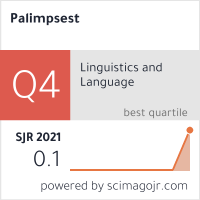EU MULTILINGUALISM AND THE LANGUAGES OF THE EASTERN PARTNERSHIP COUNTRIES: AN EXPLORATORY OVERVIEW
DOI:
https://doi.org/10.46763/PALIM21612061hwAbstract
This article provides a literature-based exploratory overview of how the European Union (EU) might deal with the linguistic challenges of incorporating the official languages of the Eastern Partnership countries – Armenia, Azerbaijan, Belarus, Georgia, Moldova, and Ukraine – into its wider activities. In the first instance, the EU’s core concepts of multilingualism and language equality are outlined. This is subsequently complemented by a summary of the current linguistic situation regarding the Eastern Partnership countries and the potential implications of wider use of their languages for the EU’s translation and interpreting services, as well as suggestions for further research on the topic.
Keywords: European Union; translation; interpreting; Armenia; Azerbaijan; Belarus; Georgia; Moldova; Ukraine.


